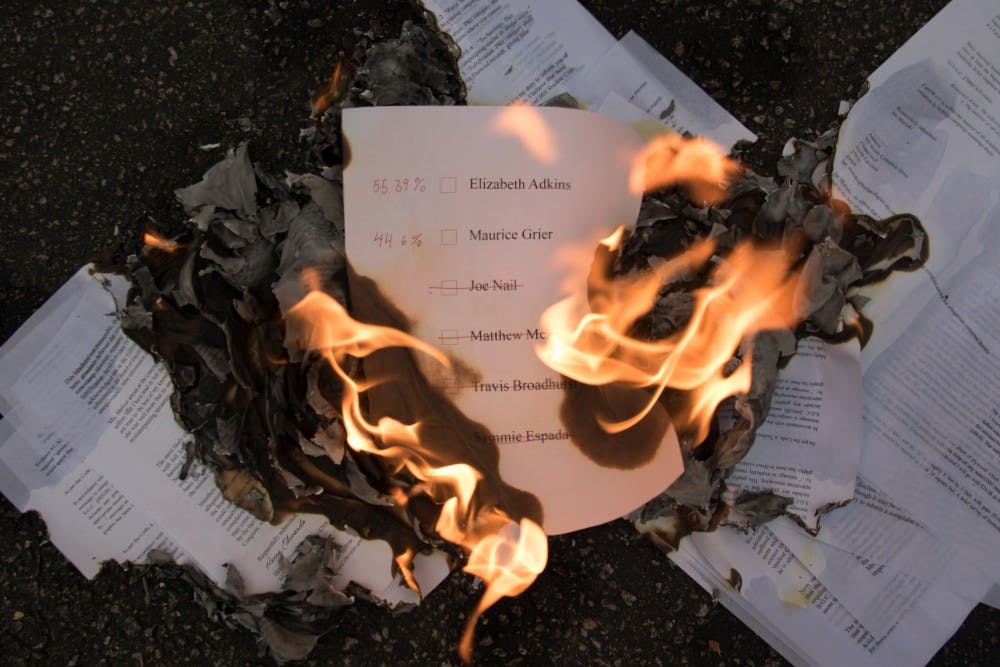Summers said he believes the UNC Board of Elections has always been a nonpartisan and unbiased group that tries to make judgments based on their interpretation of the Student Code.
“I think that’s part of the inherent risk, if you will, with the sort of system that is — even in the United States and other democracies — based upon the interpretation of the Constitution or, in this case, the Student Code; obviously there are loose and more strict interpretations of that Code, so I would say this year is more on the strict side,” Summers said.
Nail said he believes the BOE applied a stricter interpretation to his and McKnight’s cases than Grier and Adkins’ cases.
“I agree that, given the current Student Code, I should have been disqualified, but my point is that everyone should have been disqualified and the reason why the remaining candidates who ended up on the ballot didn’t get disqualified was because the Code was not actually applied to them,” Nail said.
Bias on the board
Harry Edwards, a member of the Nail campaign, said there is evidence that BOE Chairperson Paul Kushner was biased against Nail from the beginning of the election cycle and his bias impacted both the Nail and McKnight campaigns.
“I think Paul certainly felt like Joe had no respect for the rules, but, you know, even if that were the case, even if he were right and even if that were the case, as the chair of the Board of Elections, he had to give Joe a fair hearing the first time and he had to give a fair hearing the second time and I don’t think Joe got one either time,” Edwards said.
Kushner said he and other members of the Board do not believe that their conduct was biased.
“We stand by the work that we did. I think that multiple other agencies have looked at this, to determine if there was a bias. The Supreme Court was given multiple opportunities to intervene and alter our rulings and at no point did they ever see fit to do so, which I think supports the rulings that we had in the first place,” Kushner said.
During Grier’s hearing, he submitted recordings into evidence, some including conversations with Kushner and other candidates. Some individuals in the recordings have said they did not know they were being recorded.
In one recording, Kushner speaks to Grier about the Nail and McKnight campaign filing complaints against each other.
“It’s two campaigns that really hate each other that, in my opinion, are being extremely arrogant about this whole thing, in that they think they are the only two that could win and I think that that’s clearly not true,” Kushner said in the recording.
To get the day's news and headlines in your inbox each morning, sign up for our email newsletters.
Edwards said the recordings show Kushner was not performing his position as BOE chairperson fairly.
“You could be biased against someone, but you could refrain from talking about how biased you are while you’re talking to other candidates and so when Paul’s telling Maurice how much he hates Joe and Matthew, I think that’s, like, incompetence and a lack of professionalism,” Edwards said.
Edwards said in past elections the BOE chairperson would step in and de-escalate and mitigate situations in which campaign rules may have been violated, and then let the election process carry on.
“Nothing has happened in this election which hasn’t happened in every other election in terms of violations — the difference is people filing complaints and being very, very keen to file complaints and then the Board being, or at least starting, very, very keen to hand out points,” Edwards said.
Administration
Travis Broadhurst, who ran a write-in campaign, filed a complaint to the UNC Student Supreme Court against the BOE regarding the validity of Grier and Adkins’ online signatures, but later withdrew his complaint before the March 10 election.
“It has recently come to light that if this election cycle remains delayed, University administration is almost guaranteed to intervene, and administration’s interference in Student Government elections would threaten the very fabric of our 98-year-old student self-governance system,” his statement said at the time.
Andrew Brennen, a member of the Nail campaign, said it shows how comfortable University administration feels in intervening in student self-governance.
“They’ve started rumors amongst the student body that they are thinking about intervening on a long, storied, strong history of student self-governance at the University of North Carolina and as a result, they have been able to influence decisions and incentives that people have in order to do things,” Brennen said.
Nail said because the authority of student government does not come from University administration, the threat of administration intervention was not a legitimate threat but rather a tool certain student leaders used to “save face” and resolve the election.
“This threat of University, or administrative involvement or intervention was decisive in a lot of ways but not because it was legitimate, but rather because of the way it was communicated from people with higher information — namely the people who had been embarrassed — to people with lower information, which was a lot of the candidates who were just like, ‘Oh my gosh I can’t believe this would potentially happen,’” Nail said.
university@dailytarheel.com




